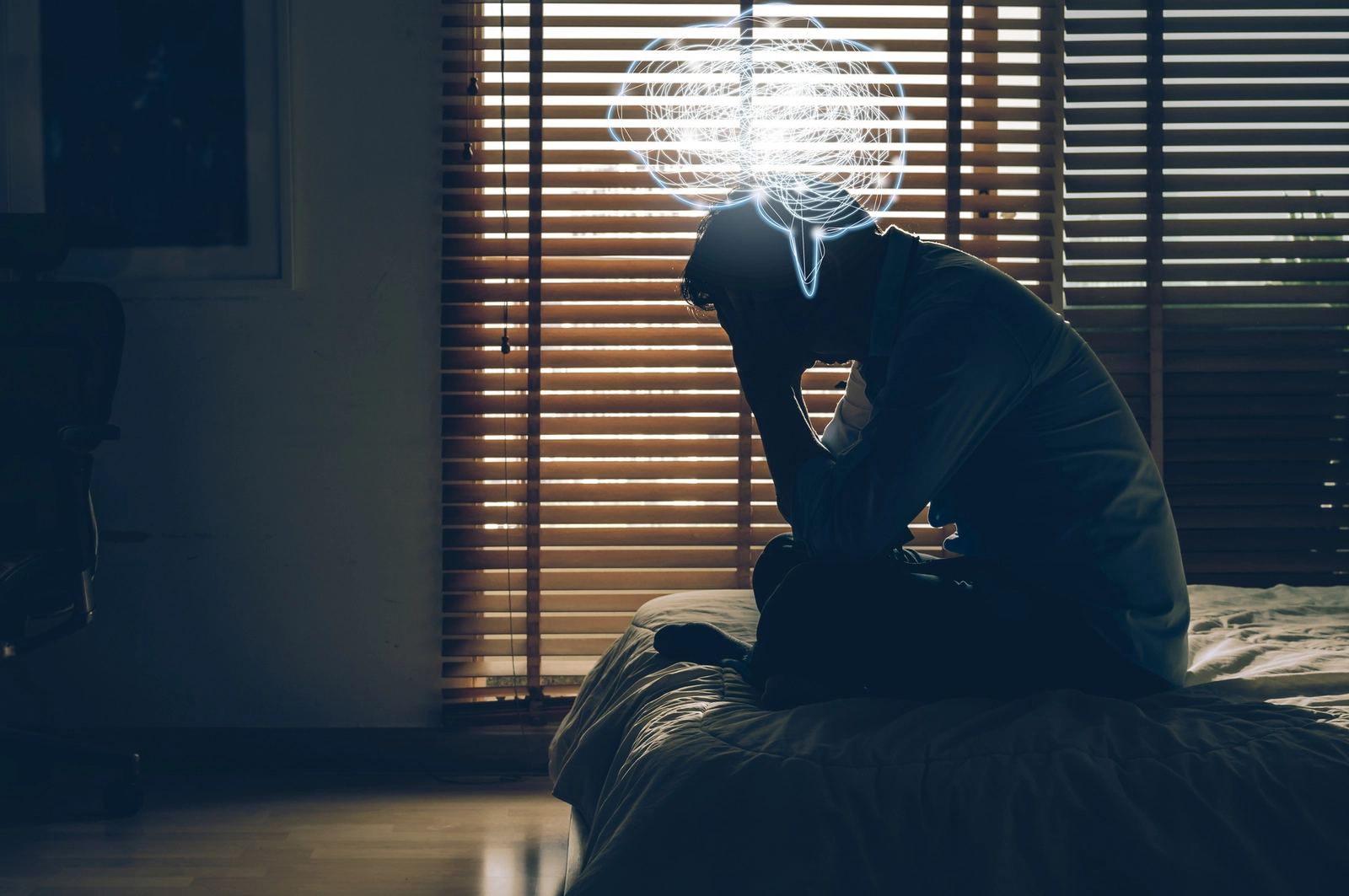Drinking alcohol is a common solution to social anxiety. People may drink to be more outgoing and feel at ease in social situations, but the next day’s hangover is the downside. In addition to physical symptoms like headache and nausea, hangovers can cause intense anxiety – or “hangxiety.”
What is anxiety? How can it be managed? Learn more about hangover anxiety and some support options.
What Is Hangover Anxiety?
Hangover anxiety is anxiety-like feelings that occur after drinking alcohol, often the day after a night of drinking. Alcohol can cause anxiety in large amounts or if it’s consumed as a coping mechanism for stress, which can cause next-day anxiety.
What Causes Hangover Anxiety?
Hangover-related anxiety is a new concept, so a single cause hasn’t been identified. However, there are a few potential causes:
Neurotransmitter Activity
Alcohol works on the brain’s gamma-aminobutyric acid (GABA) receptor, which is why you feel relaxed when you drink. If you continue drinking, the brain shuts off glutamate, which is associated with anxious feelings, causing you to feel calm and less inhibited.
As the alcohol effects wear off, the brain restores normal chemical balance by reducing GABA and increasing glutamate.[1] These processes are the opposite of the relaxation that occurs with alcohol, leading to feelings of anxiety.
Hangover anxiety also varies from person to person. People who already experience anxiety are more likely to have hangxiety.
Increased Cortisol Levels
Cortisol is a stress hormone that affects the immune, cognition, reward, and emotion systems. It increases later at night, peaks in the morning, and decreases throughout the day. It is at its lowest point in early sleep.
Heavy alcohol use disrupts this process by increasing the level of cortisol and preventing it from declining throughout the day.[2] It puts the body in a state of stress, which is compounded when you experience the physical effects of a hangover.
Increased Heart Rate
According to a meta-analysis, one drink is enough to increase the heart rate. Alcohol causes dehydration, which increases the amount of blood circulating in the body. The heart has to beat faster to compensate, contributing to anxious feelings.
Psychological Factors
Alcohol use can cause memory loss or a blur of the night before. If this happens, you may be concerned about your words or actions while you are intoxicated. You may think that people are mad at you or feel regret over drinking too much.
There’s also a link between mental health conditions and self-medicating with alcohol. People who struggle with depression and anxiety are more likely to use alcohol to self-medicate, which can worsen anxiety.
According to a study in the Journal of Abnormal Psychology that involves 412 depressed patients monitored over 10 years, 43% of people who drank to relieve their depression developed an alcohol use disorder (alcohol addiction) compared to only 15% of the people who did not use alcohol.[3] Another study found that drinking to self-medicate is linked to alcohol abuse and symptoms of anxiety or depression.[4]
Waking Up with Hangover Anxiety

When you drink heavily, you may feel sleepy. Alcohol negatively affects sleep, however, which may cause you to wake in the middle of the night. Once the alcohol wears off, you have elevated cortisol and glutamate levels that make it more difficult to stay asleep. Often, this leads to waking up with strong, anxious feelings.
How quickly hangxiety passes depends on individual factors like normal anxiety levels, genetics, how much alcohol you drank, and how regularly you drank. For most, hangxiety fades in about 24 hours, but frequent drinking may put you in a regular state of hangover anxiety.
How to Prevent Hangover Anxiety
You can reduce the likelihood of experiencing hangover anxiety by sticking to the recommended guidelines for alcohol use.[5] Men should have two drinks or less daily, while women should have one drink or less daily.
Binge drinking is defined as alcohol use that brings blood alcohol concentration to 0.08% or more, which happens if a man has 5 or more drinks in 2 hours and a woman has 4 or more drinks in 2 hours.[6]
Heavy drinking, which can include binge drinking, is defined as 5 or more drinks on any day or 15 or more a week for men, and 4 or more drinks on any day and 8 or more drinks per week for women.[7]
In the US, a standard drink contains 14 grams or 0.6 fluid ounces of pure ethanol. This includes:[8]
- 12 fl oz of regular beer (5% alcohol by volume or alc/vol)
- 8-10 fl oz of malt liquor or flavored malt beverages
- 5 fl oz of table wine
- 3-4 fl oz of fortified wine
- 2-3 fl oz of cordial, liqueur, or aperitif
- 1.5 fl oz of brandy or cognac
- 1.5 fl oz shot of distilled spirits, such as gin, rum, or vodka
If you experience general anxiety or take antidepressant medication, it’s best to avoid or limit alcohol use. Generally, the more you drink, the more intense your hangover symptoms will be. Here are some tips to reduce your drinking while out:
- Drink non-alcohol beverages between drinks
- Finish your drink before ordering another one
- Take sips
- Drink a lot of water
- Use small glasses
- Eat before and during drinking
- Stay away from spirits
- Set limits for how much you’ll drink
Mixing drugs with alcohol can increase the risk of next-day anxiety. This is especially true for drugs that have anxiety as a symptom of coming down, such as cocaine, ketamine, and MDMA (ecstasy).
How to Cope with Hangover Anxiety
If you wake up with hangxiety, here are some tips to cope:
- Drink water or an electrolyte drink to rehydrate
- Eat healthy food
- Take time to rest and recover
- Distract yourself with a show or move
- Try mindfulness or meditation
- Avoid stimulants, including caffeine, which increase anxiety
- Talk to a close friend
- Don’t drink more alcohol, which will just delay the anxiety
Struggling to Control Alcohol Use
If you often feel anxious after drinking or feel the need to drink the next day to relieve the anxiety, you may want to evaluate your drinking habits. Aside from anxiety, alcohol can have serious risks, including heart disease, liver disease, brain damage, and certain types of cancer.
Struggling with your alcohol use, despite the problems it causes, may be an alcohol use disorder. The criteria for an alcohol use disorder in the Diagnostic and Statistical Manual of Mental Disorders (DSM-5) include:[9]
- Alcohol taken in larger amounts or over a longer period than intended
- A persistent desire or unsuccessful efforts to cut down or control alcohol use
- Spending a lot of time obtaining, using, or recovering from alcohol
- Experiencing cravings for alcohol
- Recurrent alcohol use that affects your ability to fulfill obligations at work, school, or home
- Continued alcohol use despite having persistent or recurrent social or interpersonal problems
- Giving up important social, occupational, or recreational activities because of alcohol use
- Recurrent alcohol use in situations where it’s physically hazardous
- Continuing alcohol use despite persistent or recurrent physical or psychological problems
Treatment for Alcohol Addiction
Alcohol addiction can be difficult to overcome, especially since alcohol use is so normalized in society. However, you should never try to quit alcohol on your own. Regular alcohol use causes dependence, which is when the body gets accustomed to having alcohol and needs it to function. If you stop using alcohol suddenly, you can experience potentially life-threatening withdrawal symptoms like:[10]
- Anxiety
- Depression
- Fatigue
- Irritability
- Jumpiness
- Mood swings
- Nightmares
- Enlarged pupils
- Headache
- Loss of appetite
- Insomnia
- Pallor
- Sudden, severe confusion
- Hallucinations
- Seizures
Alcohol withdrawal can have dangerous complications, so medical detox is a necessary step in getting help. In medical detox, you have a full medical team to monitor your health, reduce your symptom severity, and prevent complications.
Detox is an important part of the process, but it’s not a treatment. After detox, it’s important to transition into an inpatient or outpatient alcohol addiction treatment program. While programs are individualized for your unique needs, they often include behavioral therapies and classic therapies like individual and group counseling to manage the emotional, social, and psychological aspects of addiction.
Get Help for Alcohol Addiction
Experiencing “hangxiety” on occasion isn’t necessarily anything to worry about. However, if you notice a pattern of problematic behaviors or symptoms related to drinking or struggle to moderate your drinking, it’s best to evaluate your drinking habits and consider addiction treatment. Getting help as early as possible is best to prevent significant health problems related to alcohol use.

